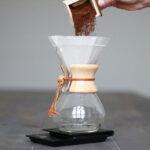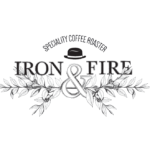Your guide to making the best coffee at home!
We love coffee, and we're sure you do to, because coffee is the worlds 3rd favourite drink. Our advice below should set you on your journey to becoming the home barista that easily rivals what can be found in the majority of high street coffee shops. You'll learn the science behind choosing the grind type for the brewing method and understanding exactly how to up your game to the standards of the professional baristas of your closest metropolitan area.
How To Make Great Coffee at home
If you want to make barista style coffee at home, there are several methods that you can choose from but there are some staples that are going to be key for getting that top quality tasting coffee at home. The following list is the first place to start if you want to start making quality specialty coffee at home, no matter if you like your espresso or filter coffee, these are the fundamental points you need to start with
There are many methods to creating a great espresso at home, and depending on your budget you can go from fully automated to completely manual and many points in between. If you are considering buying an espresso machine to brew your espresso, then this will be featured on it's own section on Make Espresso
How to choose your coffee beans
How you choose your beans will at first depend on your preferences, do you prefer a dark and aromatic roast that really packs a punch, or are you looking for a more delicate fruiter variety, do you prefer to drink it black, or create a milkier drink, there are many questions to ask yourself in the journey to becoming a home barista, but all of which will be answered over time with practice, experimentation and exploration into new techniques.
Our full guide on how to choose your coffee beans can be found here where you can find all the information you need to decipher what's on the pack of your specialty coffee. But the following are the key fundamentals to choosing coffee.
- Find a specialty coffee roaster as local as possible
- Ensure they are recently roasted
- Find coffee beans specialised for your brew method
- Decide whether you need pre-ground coffee or whole coffee beans
- Decide whether you want to add any health beneficial tinctures to your coffee
You'll eventually get a taste of what coffee you prefer, whether it's a natural processed Honduran medium roast for espresso, or a Kenyan washed processed beans for filter.
What is Specialty coffee?
Specialty coffee is set apart from others in the sense that the coffee is graded and widely accepted as getting 80 points or above in the 100 point scale by the Specialty Coffee Association SCA, not only do they rate coffee on characteristics of the coffee beans, but also on the entire supply chain, promoting a fairer and more equitable model all the way down to the farmers level. This is why mass produced coffee found in supermarkets can't make the grade.
Choosing specialty coffee brands has never been easier, we have selected some of our favourite coffee roasters from around the country that specialise in selecting fully traceable specialty beans. They have been chosen based on the quality of their roasts, varieties in their tasting notes and how seriously they take their corporate social responsibility. Take a look at these companies to see what they are about;
Step One: Pick Your Whole Bean Coffee
These Roasters are fully endorsed for providing a quality selection of freshly roasted coffee beans, perfect to start your journey for creating the professional barista quality coffee at home. Take a look at their full selections by visiting their sites;
All of the coffees found on these websites have the recommended brew method and they are usually split between filter and espresso, and that will determine how the coffee grinds.
Step Two: Measuring Your Coffee Beans
A set of scales that measures to the 10th of a gram is essential for creating a consistent serving of coffee, because we will measure the amount of ground coffee that you will be using, and then measuring the amount of coffee as you pour or pull your espresso so having decent measuring equipment is key to creating barista quality coffee at home. The following sets of scales range in price and a cheap alternative is often jewellery scales;
- Criacr Digital Pocket Scales are great as they measure up to 500g which are perfect for measuring out your initial coffee beans and when you tare the scale whilst the cup or V60 are on the scale will allow you to precisely measure the brewed coffee or espresso.
- Timemore Coffee Scale Digital Coffee Scale With Timer Is more purposely built for coffee purposes and includes a timer built in and is a great entry level scale found on Amazon.
- Hario Coffee Drip Scale with Timer - Hario is more of an established brand in the coffee industry and this is a perfect and reliable set of scales for measuring your coffee.
You will need to measure your coffee beans according to a recipe that will be to your tastes and requirements.
If you are brewing for an espresso at home, you will want somewhere between 15 and 20 grams of coffee for a double shot of espresso.
If you are brewing using pour-over or filter, many professionals work towards 60 grams per litre of water, scaled down depending on the serving size and you want to be working to a scale of 1:15 to 1:17 with slight adjustments depending on other variables.
Once you have found a recipe that works for you, you can stick to that.
Step Three: Grinding Only What You Need
Finding a quality grinder is probably the single most difficult part of brewing your quality coffee at home, as you need a grinder that will be able to provide you a consistent but fully adjustable grind size, no matter what your chosen brewing method will be. Many seasoned home baristas and professionals alike will say that the grinder is more important than the machine when it comes to espresso. Ideally you want to be aiming for a step less, burr-grinder, especially if you are grinding for espresso, but there are some great choices out there.
Hand Grinders cost between £30 and £100 and will get an espresso level grind
Hario Hand Grinder - Timemore C2 Manual Grinder
Grinders good enough for filter and pour over will cost £50 and above
Shardor Conical Burr Grinder - Baratza Encore Conical Grinder
For espresso using a stove top moka pot then you can expect to pay upwards of £50 to £70
Espresso machines require the most investment on your grinder, but you can pick up second hand ones on eBay for a good price, if you have an espresso machine, but for a good home grinder can be upwards of £500.
Then it's all about getting into tune with your grinder and brew method. You can't be too precious about the beans whilst you're dialling in.
Step four: Use Filtered Water
A key component of making good coffee is by addressing the natural hardness and mineral content of the water that comes out of your tap at home. According to the SCA, the water should be clean and free of odours, be free of chlorine and have a neutral PH rating and around 150mg of dissolved minerals per litre, broken up between salts and calcium. Many bottled filtered water provide this information on the bottle, which makes selecting the right water as easy as visiting the local supermarket.
Using a cartridge loaded Brita filter jug is an easy and inexpensive method of filtering your water at home for coffee. There are cheap and effective ways to check your water hardness with testing strips, but you will want to stick to using filtered water for your coffee, because it makes it taste better, and removing the calcium will prolong the life of your equipment.
Step Five: Choose your Brewing Method
This will define the way you consume your coffee, you will need to refine your technique
Inexpensive: French Press and a Moka Pot
Expensive: Gooseneck kettle,
Coffee Setup Lists
Based on your budget, you can build the following set-ups, from reasonably inexpensive to mid range, to the best possible home barista setup.





